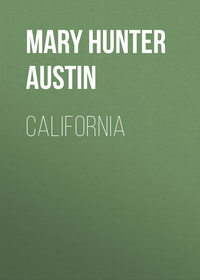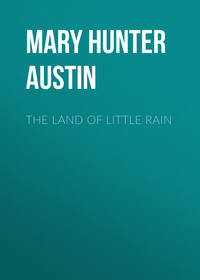 полная версия
полная версияThe Basket Woman: A Book of Indian Tales for Children
The Coyote advised them how the march should begin. The boy and the Counselor went foremost, next to them the swiftest runners, with the others following in the order of their strength and speed. They left the place of their home and went over the high mountains where great jagged peaks stand up above the snow, and down the way the streams led through a long stretch of giant wood where the sombre shade and the sound of the wind in the branches made them afraid. At nightfall where they rested one stayed in that place, and the next night another dropped behind, and so it was at the end of each day's journey. They crossed a great plain where waters of mirage rolled over a cracked and parching earth and the rim of the world was hidden in a bluish mist; so they came at last to another range of hills, not so high but tumbled thickly together, and beyond these, at the end of the hundred days, to the Big Water quaking along the sand at the foot of the Burning Mountain.
It stood up in a high and peaked cone, and the smoke of its burning rolled out and broke along the sky. By night the glare of it reddened the waves far out on the Big Water when the Fire Spirits began their dance.
Then said the Counselor to the boy who was soon to be called the Fire Bringer, "Do you stay here until I bring you a brand from the burning; be ready and right for running, and lose no time, for I shall be far spent when I come again, and the Fire Spirits will pursue me." Then he went up the mountain, and the Fire Spirits when they saw him come were laughing and very merry, for his appearance was much against him. Lean he was, and his coat much the worse for the long way he had come. Slinking he looked, inconsiderable, scurvy, and mean, as he has always looked, and it served him as well then as it serves him now. So the Fire Spirits only laughed, and paid him no farther heed. Along in the night, when they came out to begin their dance about the mountain, the Coyote stole the fire and began to run away with it down the slope of the Burning Mountain. When the Fire Spirits saw what he had done, they streamed out after him red and angry in pursuit, with a sound like a swarm of bees.
The boy saw them come, and stood up in his place clean limbed and taut for running. He saw the sparks of the brand stream back along the Coyote's flanks as he carried it in his mouth and stretched forward on the trail, bright against the dark bulk of the mountain like a falling star. He heard the singing sound of the Fire Spirits behind and the labored breath of the Counselor nearing through the dark. Then the good beast panted down beside him, and the brand dropped from his jaws. The boy caught it up, standing bent for the running as a bow to speeding the arrow; out he shot on the homeward path, and the Fire Spirits snapped and sung behind him. Fast as they pursued he fled faster, until he saw the next runner stand up in his place to receive the brand. So it passed from hand to hand, and the Fire Spirits tore after it through the scrub until they came to the mountains of the snows. These they could not pass, and the dark, sleek runners with the backward-streaming brand bore it forward, shining star-like in the night, glowing red through sultry noons, violet pale in twilight glooms, until they came in safety to their own land. Here they kept it among stones, and fed it with small sticks, as the Coyote had advised, until it warmed them and cooked their food. As for the boy by whom fire came to the tribes, he was called the Fire Bringer while he lived, and after that, since there was no other with so good a right to the name, it fell to the Coyote; and this is the sign that the tale is true, for all along his lean flanks the fur is singed and yellow as it was by the flames that blew backward from the brand when he brought it down from the Burning Mountain. As for the fire, that went on broadening and brightening and giving out a cheery sound until it broadened into the light of day, and Alan sat up to hear it crackling under the coffee-pot, where his father was cooking their breakfast.
THE CROOKED FIR
THE CROOKED FIRThe pipsissawa, which is sometimes called prince's pine, is half as tall as the woodchuck that lives under the brown boulder; and the seedling fir in his first season was as tall as the prince's pine, so for the time they made the most of each other's company. The woodchuck and the pipsissawa were never to be any taller, but the silver fir was to keep on growing as long as he stood in the earth and drew sap. In his second season, which happened to be a good growing year, the fir was as tall as the woodchuck and began to look about him.
The forest of silver firs grew on a hill-slope up from a water-course as far as the borders of the long-leaved pines. Where the trees stood close together the earth was brown with the litter of a thousand years, and little gray hawks hunted in their green, windy glooms. In the open spaces there were thickets of meadowsweet, fireweed, monkshood, and columbine, with saplings and seedlings in between. When the fir which was as tall as the woodchuck had grown a year or two longer, he made a discovery. All the firs on the hill-slope were crooked! Their trunks bulged out at the base toward the downward pitch of the hill; and it is the proper destiny of fir trees to be straight.
"They should be straight," said the seedling fir. "I feel it in my fibres that a fir tree should be straight." He looked up at the fir mother very far above him on her way to the sky, with the sun and the wind in her star-built boughs.
"I shall be straight," said the seedling fir.
"Ah, do not be too sure of it," said the fir mother. But for all that the seedling fir was very sure, and when the snow tucked him in for the winter he took a long time to think about it. The snows are wonderfully deep in the cañon of the silver firs. From where they gather in the upper air the fir mother shakes them lightly down, packing so softly and so warm that the seedlings and the pipsissawas do not mind.
About the time the fir had grown tall enough to be called a sapling he made another discovery. The fir mother had also a crooked trunk. The sapling was greatly shocked; he hardly liked to speak of it to the fir mother. He remembered his old friend the pipsissawa, but he had so outgrown her that there was really no comfort in trying to make himself understood, so he spoke to the woodchuck. The woodchuck was no taller than he used to be, but when he climbed up on the brown boulder above his house he was on a level with the sapling fir, and though he was not much of a talker he was a great thinker and had opinions.
"Really," said the fir, "I hardly like to speak of it, but you are such an old friend; do you see what a crook the fir mother has in her trunk? We firs you know were intended to be straight."
"That," said the woodchuck, "is on account of the snow."
"But, oh, my friend," said the sapling, "you must be mistaken. The snow is soft and comfortable and braces one up. I ought to know, for I spend whole winters in it."
"Gru-r-ru-," said the woodchuck crossly; "well for you that you do, or I should have eaten you off by now."
After this the little fir kept his thoughts to himself; he was very much afraid of the woodchuck, and there is nothing a young fir fears so much as being eaten off before it has a chance to bear cones. But in fact the woodchuck spent the winter under the snow himself. He went into his house and shut the door when the first feel of snow was in the air, and did not come out until green things began to grow in the cleared spaces.
Not many winters after that the fir was sufficiently tall to hold the green cross, that all firs bear on their topmost bough, above the snow most of the winter through. Now he began to learn a great many things. The first of these was about the woodchuck.
"Really that fellow is a great braggart," said the fir; "I cannot think how I came to be afraid of him."
In those days the sapling saw the deer getting down in the flurry of the first snows to the feeding grounds on the lower hills, saw the mountain sheep nodding their great horns serenely in the lee of a tall cliff through the wildest storms. In the spring he saw the brown bears shambling up the trails, ripping the bark off of dead trees to get at the worms and grubs that harbored there; lastly he saw the woodchuck come out of his hole as if nothing had ever happened.
And now as the winters came on, the fir began to feel the weight of the snow. When it was wet and heavy and clung to its branches, the little fir shivered and moaned.
"Droop your boughs," creaked the fir mother; "droop them as I do, and the snow will fall."
So the sapling drooped his fan-spread branches until they lay close to the trunk; and the snow wreaths slipped away and piled thickly about his trunk. But when the snow lay deep over all the slope, it packed and slid down toward the ravine and pressed strongly against the sapling fir.
"Oh, I shall be torn from my roots," he cried; "I shall be broken off."
"Bend," said the fir mother, "bend, and you will not break." So the young fir bent before the snow until he was curved like a bow, but when the spring came and the sap ran in his veins, he straightened his trunk anew and spread his branches in a star-shaped whorl.
"After all," said the sapling, "it is not such a great matter to keep straight; it only requires an effort."
So he went on drooping and bending to the winter snows, growing strong and straight with the spring, and rejoicing. About this time the fir began to feel a tingling in his upper branches.
"Something is going to happen," he said; something agreeable in fact, for the tree was fifty years old, and it was time to grow cones. For fifty years a silver fir has nothing to do but to grow branches, thrown out in annual circles, every one in the shape of a cross. Then it grows cones on the topmost whorl, royal purple and burnished gold, erect on the ends of the branches like Christmas candles. The sapling fir had only three in his first season of bearing, but he was very proud of them, for now he was no longer a sapling, but a tree.
When one has to devote the whole of a long season to growing cones, one has not much occasion to think of other things. By the time there were five rows of cone-bearing branches spread out broadly from the silver fir, the woodchuck made a remark to the pipsissawa which is sometimes called prince's pine. It was not the same pipsissawa, nor the same woodchuck, but one of his descendants, and his parents had told him the whole story.
"It seems to me," said he, "that the fir tree is not going to be straight after all. He never seems quite to recover from the winter snow."
"Ah," said the pipsissawa, "I have always thought it better to have your seeds ripe and put away under ground before the snow comes. Then you do not mind it at all."
The woodchuck was right about the fir; his trunk was beginning to curve toward the downward slope of the hill with the weight of the drifts. And that went on until the curve was quite fixed in the ripened wood, and the fir tree could not have straightened up if he had wished. But to tell the truth, the fir tree did not wish. By the end of another fifty years, when he wagged his high top above the forest gloom, he grew to be quite proud of it.
"There is nothing," he said to the sapling firs, "like being able to endure hard times with a good countenance. I have seen a great deal of life. There are no such snows now as there used to be. You can see by the curve of my trunk what a weight I have borne."
But the young firs did not pay any attention to him. They had made up their minds to grow up straight.
THE SUGAR PINE
THE SUGAR PINEBefore the sugar pine came up in the meadow of Bright Water it had swung a summer long in the burnished cone of the parent tree, until the wind lifted it softly to the earth where it swelled with the snow water and the sun, and began to grow into a tree. But it knew nothing whatever of itself except that it was alive and growing; and in its first season was hardly so tall as the Little Grass of Parnassus that crowded the sod at the Bright Water. In fact, it was a number of years before it began to overtop the meadowsweet, the fireweed, the tall lilies, the monkshood, and columbine, and under these circumstances it could not be expected to have much of an opinion of itself.
During those years the young pine suffered a secret mortification because it had no flowers. It stood stiff and trimly in its plain dark green, every needle like every other one, and no honey-gatherer visited it. When all the meadow ran over with rosy and purple bloom, the pine tree trembled and beads of clear resin oozed out upon its bark like tears; and the trouble really seemed worse than it was because everybody made so much of it. Even the hummingbirds as they came hurtling through the air would draw back conspicuously when they came to the pine, and though they said politely, "I beg your pardon, I took you for a flower," the seedling felt it would have been better had they said nothing at all.
"Well, why don't you grow flowers?" said the meadowsweet; "it is easy enough. Just do as I do," and she spread her drift of blossoms like a fragrant snow. But the sugar pine found it impossible to be anything but stiff and plainly green, though every year in the stir and tingle of new sap he felt a promise of better things.
"I suppose," he said one day, "I must be in some way different from the rest of you."
"Ah, that is the way with you solemn people," said the fireweed, "always imagining yourself better than those about you to excuse your disagreeableness. Any one can see by the way you hold yourself that you have too much of an opinion of yourself."
The little pine tree sighed; he had not said "better," only "different," and he began to realize year by year that this was so.
"You should try to be natural," said the meadowsweet; "do not be so stiff, and then every one will love you though you are so plain."
Then the sugar pine reached out and tried to mingle with the flowers, but the sharp needles tore their frills and the stiff branches did not suit with their graceful swaying, so he was obliged to give it up. It seemed, in fact, the more he tried to be like the others the worse he grew.
"If only you were not so odd," said all the flowers. None of the young growing things in the meadow understood that it is natural for a pine tree to be stiff.
The sugar pine was not always unhappy. There were days when he caught golden glints of the stream that ran smoothly about the meadow, in a bed of leopard-colored stones, and, reflecting all the light that fell into the hollow of the hills, gave the place its name; days when the air was warm and the sky was purely blue, and the resinous smell of the pines on the meadow border came to the seedling like a sweet savor in a dream, for as yet he did not understand what he was to be. He was pleased just to be looking at the summer riot of the flowering things, and loved the cool softness of the snow when he was tucked into comfortable darkness to dream of the spring odor of the pines. Then, when it seemed that the meadow had forgotten him, the little tree would fall to thinking the thoughts proper to his kind, and found the time pass pleasantly.
"I suppose," he thought, "it is not good for me to flower as the other plants. If I began like them I should probably end like them, and I feel that I could not be satisfied with that. After all, one should not try to be so much like others, but to be the very best of one's own sort."
Very early the young tree had noticed that he was the only one of all that company that kept green and growing the winter through. He would have been secretly very proud of it, but the flowers took good care to let him know their opinion of such airs.
"It is simply that you wish to be considered peculiar," said the columbine; "one sees that you like nothing so much as to be in other people's mouths, but let me tell you, you will not get yourself any better liked by such behavior." After that the little tree wished nothing so much as that he might be the commonest summer-flowering weed.
"But I am not," he said; "no, I am not, and I would do very well as I am if they would let me be happy in my own way."
That summer the seedling grew as tall as the meadowsweet, and could look across the open space to the parent pine poised on her noble shaft, her spreading crown gathering sunshine from the draughts of upper air. She seemed to rock a little as if she dozed upon her feet, and the great sweep of limbs with pendulous golden cones made a gentle sighing. Then the despised little seedling felt a thrill go through him, and felt a shaking in all his slender twigs. He bowed himself among the lilies, and was both glad and ashamed, for though he could not well believe it, he knew himself akin to the great sugar pines. After that he gave up trying to be one of the flowers. Once he even ventured to speak of it to the meadowsweet.
"Well, if it is any satisfaction to you to think so; but do not let any one else hear you say that. You are likely to get yourself misunderstood. I tell you this because I am your friend," said the meadowsweet, but really she had misunderstood him herself.
Then a rumor arose in the neighborhood that the sombre, stubborn shrub conceited himself to be a pine, and the rumor ran with laughter and nodding the length of the meadow until it reached the old alder on the edge of Bright Water. The alder had stood with his feet in the stream for longer than the meadowsweet could remember, and saw everything that went on by reflection.
"Do not laugh too soon," said the alder tree, "I have seen stranger things than that happen in this meadow," for he was indeed very old.
"We have known him a good many seasons," said the fireweed, "and he has not done anything worth mentioning yet."
All this was very hard for the young pine to bear, but there was better coming. That summer the forest ranger came riding in Bright Water and a learned man rode with him, praising the flowers and counting the numbers and varieties of bloom. How they prinked and flaunted in their pride!
"That is all very pretty, as you say," answered the ranger as they came by the place of the pine, "and I suppose they perform a sort of service in keeping the soil covered, but the trees are the real strength of the mountain. Ah, here is a seedling of the right sort! I must give that fellow a chance," and he began pulling up great handfuls of the blossoming things around the tree.
"What is it?" asked his companion.
"A sugar pine," he said; "probably a seedling of that splendid specimen yonder," and he went on clearing the ground to let in sun and air.
"But you must admit," said his friend, "that a seedling pine cuts rather a poor figure among all this flare of bloom."
"Oh, you wait fifty or sixty years," said the ranger, "and then you will see what sort of a figure it makes. It really takes a pine of this sort a couple of hundred years to reach its prime," and they rode talking up the trail.
Word of what had happened was carried all about the meadow and made a great stir. When it came to the alder tree he wagged his old head. "Ah, well," he said, "I told you so."
"I will not believe it until I see it," said the fireweed.
"They might have known it before," sighed the young pine, "and they ought to be proud to think I grew up in the same meadow with them."
But they were not; they went on flaunting their blossoms as if nothing had occurred, and the young tree grew up as he was meant to be, and the pines on the meadow border sent him greeting on the wind. He still kept his trim spire-shaped habit, but he could very well put up with that for the time being. He felt within himself the promise of what he was to be. After fifty or sixty years, as the ranger had said, he began to put out strong cone-bearing boughs that shaped themselves by the storms and the wind in sweeping, graceful lines, and spread out to shelter the horde of flowering things below. Squirrels ran up the trunk and whistled cheerily in his windy top.
"He grew here in our neighborhood," said the tall lilies; "we knew him when he was a seedling sprig, and now he is the tallest of the pines."
"Suppose he is," said the fireweed. "What is the good of a pine tree anyway?"
But the sugar pine did not hear. He had grown far above the small folk of the meadow, and went on growing for a hundred years. He gathered the sun in his high branches and rocked upon his shaft. He talked gently in his own fashion with his own kind.
THE GOLDEN FORTUNE
THE GOLDEN FORTUNEA little way up from the trail that goes toward Rex Monte, not far from the limit of deep snows, there is what looks to be a round dark hole in the side of the mountain. It is really the ruined tunnel of an old mine. Formerly a house stood on the ore dump at one side of the tunnel, a little unpainted cabin of pine; but a great avalanche of snow and stones carried them, both the house and the dump, away. The cabin was built and owned by a solitary miner called Jerry, and whether he ever had any other name no one in the town below Kearsarge now remembers.
Jerry was old and lean, and his hair, which had been dark when he was young, was now bleached to the color of the iron-rusted rocks about his mine. For thirty years he had prospected and mined through that country from Kearsarge to the Coso Hills, but always in the pay of other men, and at last he had hit upon this ledge on Rex Monte. To all who looked, it showed a very slender vein between the walls of country rock, and the ore of so poor a quality that with all his labor he could do no more than keep alive; but to all who listened, Jerry could tell a remarkable story of what it had been, and what he expected it to be. Very many years ago he had discovered it at the end of a long prospect, when he was tired and quite discouraged for that time. There was not much passing then on the Rex Monte, and Jerry drew out of the trail here in the middle of the afternoon to rest in the shadow of a great rock. So while he lay there very weary, between sleeping and waking, he gazed out along the ground, which was all strewn with rubble between the stiff, scant grass. As he looked it seemed that certain bits of broken stone picked themselves out of the heap, and grew larger, in some way more conspicuous, until, Jerry averred, they winked at him. Then he reached out to draw them in with his hand, and saw that they were all besprinkled with threads and specks of gold. You may guess that Jerry was glad, then that he sprang up and began to search for more stones, and so found a trail of them, and followed it through the grass stems and the heather until he came to the ledge cropping out by a dike of weathered rocks. And in those days the ledge was ah, so rich! Now it seemed that Jerry was to have a mine of his own. So he named it the Golden Fortune, and told no man what he had found, but went down to the town which lies in a swale at the foot of Kearsarge, and brought back as much as was needful for working the mine in a simple way.
It was nearing the end of the summer, when the hills expect the long thunder and drumming rain, and, not many weeks after that, the quiet storms that bring the snow. Jerry had enough to do to make all safe and comfortable at the Golden Fortune before winter set in. It was too steep here on the hill-slope for the deep snows to trouble him much, so he built his cabin against the rock, with a covered way from it to the tunnel of the mine, that he might work on all winter at no unease because of storms.
It was perhaps a month later, with Jerry as busy as any of the wild folk thereabout, and the nights turning off bitter cold with frost. Of mornings he could hear the thin tinkle of the streams along fringes of delicate ice. It was the afternoon of a day that fell warm and dry with a promise of snow in the air. Jerry was roofing in his cabin, so intent that a voice hailed him before he was aware that there was a man on the trail. Jerry knew at once by his dress and his speech that he was a stranger in those parts, and he saw that he was not very well prepared for the mountain passes and the night. He knew this, I say, with the back of his mind, but took no note of it, for he was so occupied with his house and his mine. He suffered a fear to have any man know of his good fortune lest it should somehow slip away from him. So when the stranger asked him some questions of the trail, it seemed that what Jerry most wished was to get rid of him as quickly as possible. He was a young man, ruddy and blue-eyed, and a foreigner, what was called in careless miners' talk, "some kind of a Dutchman," and could not make himself well understood. Jerry gathered that he desired to know if he were headed right for the trail that went over to the Bighorn Mine, where he had the promise of work. So they nodded and shrugged, and Jerry made assurance with his hands, as much as to say, it is no great way; and when the young man had looked wistfully at the cabin and the boding sky, he moved slowly up the trail. When he came to the turn where it goes toward Rex Monte, he lingered on the ridge to wave good-by, so Jerry waved again, and the man dropped out of sight. At that moment the sun failed behind a long gray film that deepened and spread over all that quarter of the sky.







